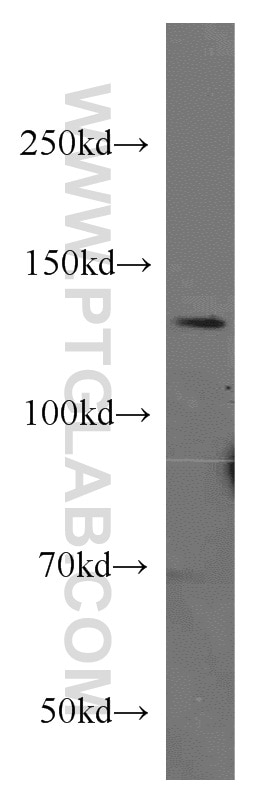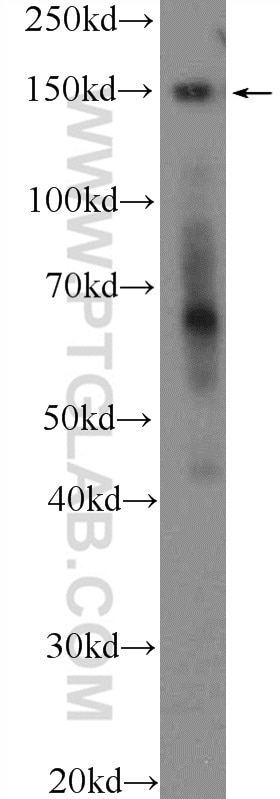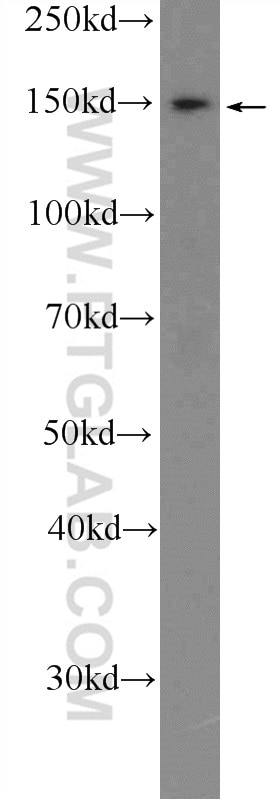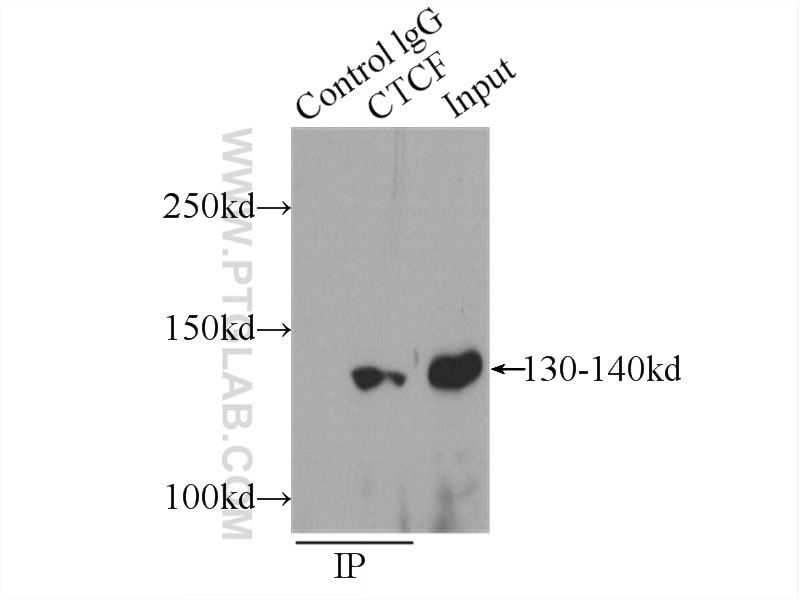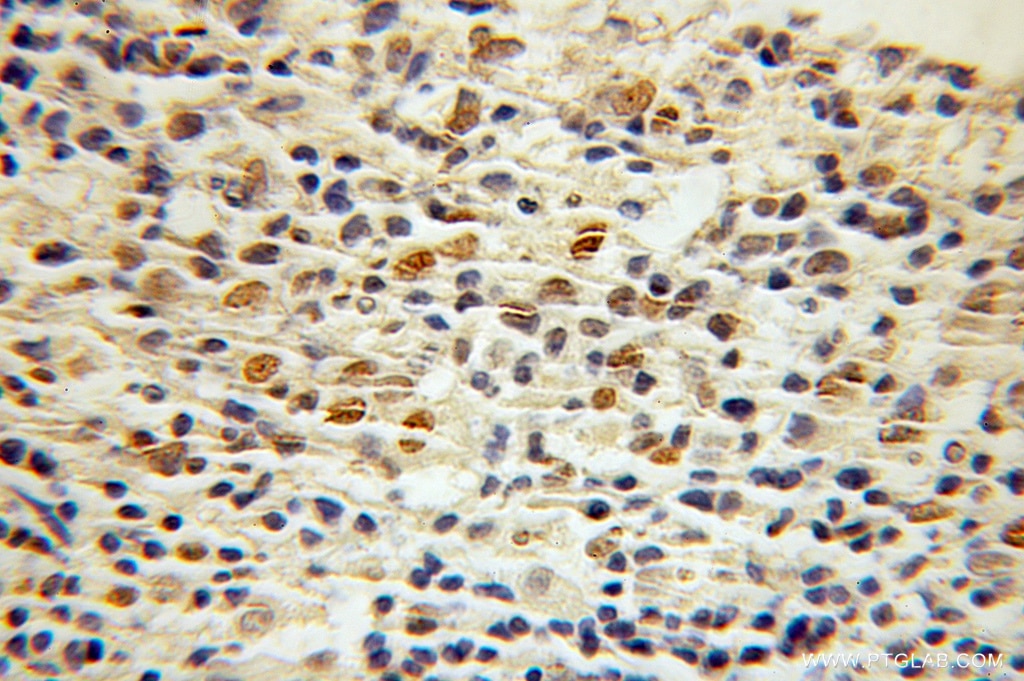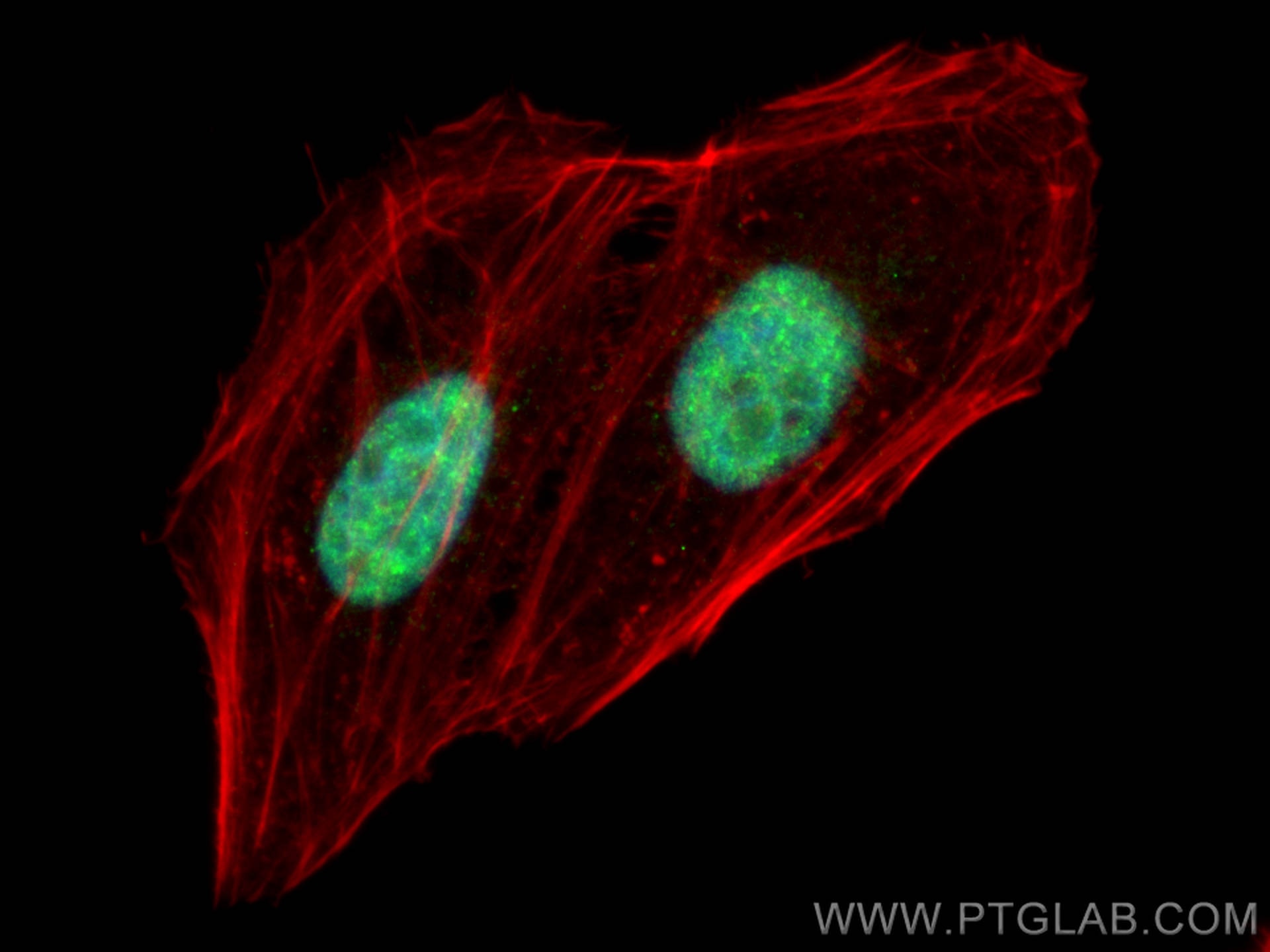CTCF Polyklonaler Antikörper
CTCF Polyklonal Antikörper für WB, IHC, IF/ICC, IP, ELISA
Wirt / Isotyp
Kaninchen / IgG
Getestete Reaktivität
human, Maus
Anwendung
WB, IHC, IF/ICC, IP, ChIP, RIP, ELISA
Konjugation
Unkonjugiert
Kat-Nr. : 10915-1-AP
Synonyme
Geprüfte Anwendungen
| Erfolgreiche Detektion in WB | humanes Hirngewebe, 4T1-Zellen, HEK-293T-Zellen |
| Erfolgreiche IP | MCF-7-Zellen |
| Erfolgreiche Detektion in IHC | humanes Lymphomgewebe Hinweis: Antigendemaskierung mit TE-Puffer pH 9,0 empfohlen. (*) Wahlweise kann die Antigendemaskierung auch mit Citratpuffer pH 6,0 erfolgen. |
| Erfolgreiche Detektion in IF/ICC | HepG2-Zellen |
Empfohlene Verdünnung
| Anwendung | Verdünnung |
|---|---|
| Western Blot (WB) | WB : 1:500-1:1000 |
| Immunpräzipitation (IP) | IP : 0.5-4.0 ug for 1.0-3.0 mg of total protein lysate |
| Immunhistochemie (IHC) | IHC : 1:20-1:200 |
| Immunfluoreszenz (IF)/ICC | IF/ICC : 1:200-1:800 |
| It is recommended that this reagent should be titrated in each testing system to obtain optimal results. | |
| Sample-dependent, check data in validation data gallery | |
Veröffentlichte Anwendungen
| WB | See 4 publications below |
| ChIP | See 1 publications below |
| RIP | See 1 publications below |
Produktinformation
10915-1-AP bindet in WB, IHC, IF/ICC, IP, ChIP, RIP, ELISA CTCF und zeigt Reaktivität mit human, Maus
| Getestete Reaktivität | human, Maus |
| In Publikationen genannte Reaktivität | human |
| Wirt / Isotyp | Kaninchen / IgG |
| Klonalität | Polyklonal |
| Typ | Antikörper |
| Immunogen | CTCF fusion protein Ag1340 |
| Vollständiger Name | CCCTC-binding factor (zinc finger protein) |
| Berechnetes Molekulargewicht | 83 kDa |
| Beobachtetes Molekulargewicht | 55-100 kDa, 130-150 kDa |
| GenBank-Zugangsnummer | BC014267 |
| Gene symbol | CTCF |
| Gene ID (NCBI) | 10664 |
| Konjugation | Unkonjugiert |
| Form | Liquid |
| Reinigungsmethode | Antigen-Affinitätsreinigung |
| Lagerungspuffer | PBS with 0.02% sodium azide and 50% glycerol |
| Lagerungsbedingungen | Bei -20°C lagern. Nach dem Versand ein Jahr lang stabil Aliquotieren ist bei -20oC Lagerung nicht notwendig. 20ul Größen enthalten 0,1% BSA. |
Hintergrundinformationen
Transcriptional insulators are DNA elements that set boundaries on the actions of enhancer and silencer elements and thereby organize the eukaryotic genome into regulatory domains. All vertebrate insulators appear to use the versatile CTCF protein. CTCF uses various combinations of its 11 zinc fingers to recognize a variety of unrelated DNA sequences. Once bound to DNA, CTCF can function as a transcriptional insulator, repressor, or activator, depending on the context of the binding site [PMID:12787766,15454938]. In vertebrates, this 11 zinc-finger protein is shown to be crucial in processes of epigenetic imprinting, X chromosome inactivation , and associated with various complex human diseases including cancer and diabetes [PMID:23139640]. The calcualted molecular weight of CTCF is 83 kDa, but stimulation of human corneal epithelial cells with hypoxic stress suppressed a high molecular mass form of CTCF (150 kDa), but not a lower molecular weight form of CTCF (130 kDa)(PMID: 22354964), and there are multiple isoforms of CTCF with molecular masses of 55, 70, 73, 80, 97, and 130 kDa have been observed (PMID: 12878173).
Protokolle
| PRODUKTSPEZIFISCHE PROTOKOLLE | |
|---|---|
| WB protocol for CTCF antibody 10915-1-AP | Protokoll herunterladen |
| IHC protocol for CTCF antibody 10915-1-AP | Protokoll herunterladenl |
| IF protocol for CTCF antibody 10915-1-AP | Protokoll herunterladen |
| IP protocol for CTCF antibody 10915-1-AP | Protokoll herunterladen |
| STANDARD-PROTOKOLLE | |
|---|---|
| Klicken Sie hier, um unsere Standardprotokolle anzuzeigen |
Publikationen
| Species | Application | Title |
|---|---|---|
Sci Total Environ Transcriptome sequencing analysis reveals a potential role of lncRNA NONMMUT058932.2 and NONMMUT029203.2 in abnormal myelin development of male offspring following prenatal PM2.5 exposure | ||
Carcinogenesis Hepatocellular carcinoma risk variant modulates lncRNA HLA-DQB1-AS1 expression via a long-range enhancer-promoter interaction. | ||
mBio A Low-Producing Haplotype of Interleukin-6 Disrupting CTCF Binding Is Protective against Severe COVID-19. | ||
Cancer Cell Int CTCF-activated FUCA1 functions as a tumor suppressor by promoting autophagy flux and serum α-L-fucosidase serves as a potential biomarker for prognosis in ccRCC | ||
Cell Signal USP27 promotes glycolysis and hepatocellular carcinoma progression by stabilizing PFKFB3 through deubiquitination | ||
Adv Sci (Weinh) TWF2 Drives Tumor Progression and Sunitinib Resistance in Renal Cell Carcinoma through Hippo Signaling Suppression |
